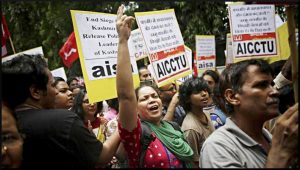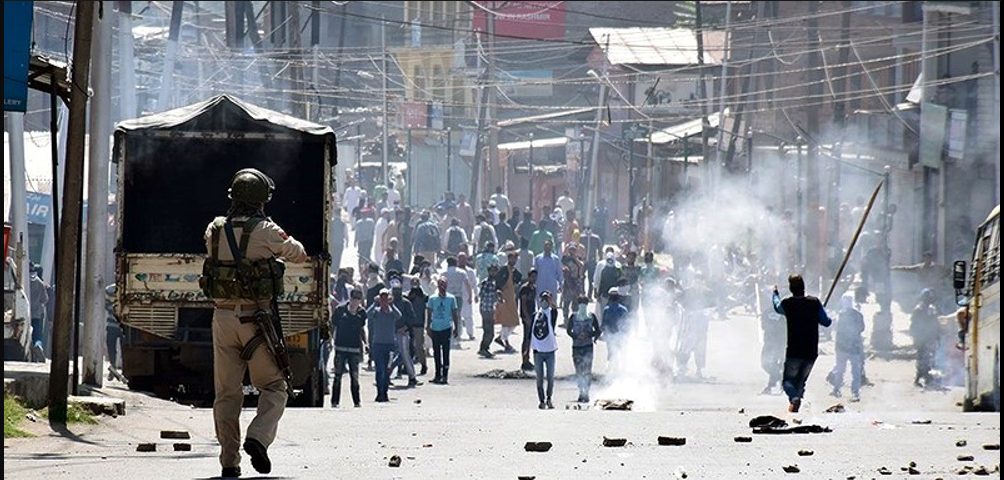By Ruwan Munasinghe, published in Socialist Action, August 8, 2019
Late on Sunday, Aug. 4, with hardly a notice, India moved tens of thousands of troops into what is already the most militarized region on the planet. In Indian-administered Kashmir, politicians, especially opposition leaders (but even some loyal to India), were placed under house arrest. Internet and landline service have been cut. Free assembly has been banned. Many non-Kashmirs and tourists were advised to flee. Many with family members in Kashmir are still left wondering about the safety of loved ones.
All of this comes as New Delhi has rushed through a presidential decree to revoke Article 370, the part of the constitution that gives Indian-administered Kashmir special status. Also, the Indian parliament pushed through the “Jammu and Kashmir Reorganization Bill,” which seeks to bifurcate the area into Jammu and Kashmir, and Ladakh (which will be ruled over directly by the Indian government via a Lieutenant Governor).
In an earlier Socialist Action article, entitled “Modi’s reelection in India: More Attacks on Workers and Ethnic Minorities,” I mentioned that the reelection of right-wing Indian Prime Minister Nahrendera Modi (leader of the Hindu Nationalist BJP and member of the semi-facist RSS) in late June was, among many other things, likely to continue and worsen racist policies against ethnic minorities. It was argued that one of the results of this would play out on a macro scale in the geopolitical issues regarding Kashmir.
Modi and the BJP have maintained very reactionary views toward majority Muslim Kashmir and have exploited any developments in Kashmir for their own interests. A good example of this was the Pulwama attack earlier this year, which resulted in the Indian airforce’s launching an airstrike in Pakistani territory. On the morning of Aug. 5, it became clear that these predictions about India’s growing belligerence toward Kashmir were coming true quicker than imagined.
This is a concerted and well thought-out attempt by the right-wing BJP and its sympathizers. They want to eliminate article 370 of the constitution—to jettison the autonomous status of Kashmir and the power of the regional government. They also want to do away with Article 35A, which permits the local legislature in Indian-administered Kashmir to define its permanent residents and control property rights.
The election manifesto of Modi specifically states:
“We are committed to overcome all obstacles that come in the way of development and provide adequate financial resources to all the regions of the state [of Kashmir]. We reiterate our position since the time of the JanSangh to the abrogation of Article 370.”
Victoria Schofield, author of “Kashmir in Conflict,” explained to Al Jazeera recently that there has been a gradual erosion of article 370 for years. However, the disposal of article 35A, in particular, sets a legal justification for a situation in which Kashmir can be taken over by Hindu settlers and Indian corporations. Kashmiris would have little to no ability to fight this, as they are completely stripped of political clout. This would actually change the demographics of Kashmir. She says,
“If article 35A goes, you’ve got any number of people from the rest of India feeling that they can come up and buy property in Jammu and Kashmir.”
Indeed, this seems to be a longer-term vision of the BJP itself. The election manifesto of Modi stated:
“We are committed to annulling Article 35A of the constitution of India as the provision is discriminatory against non-permanent residents and women of Jammu and Kashmir.”
It continued,
“We will make an effort to ensure the safe return of Kashmiri Pandits and we will provide financial assistance for the resettlement of refugees from West Pakistan, Pakistan Occupied Jammu and Kashmir (POJK) and Chhamb.”
Clearly, the BJP is invested in a project to allow Hindus (and perhaps friendly corporations) to have priority to move to Kashmir and buy up land. From Modi’s perspective it is Hindu Kashmiris (Pandits), who might have left Kashmir since independence or during violence in the region over the decades, that are the oppressed people in this situation—not the predominantly Muslim Kashmiris who have been living under occupation even before independence and have been consistently denied the right to voice their political will.
During Indian independence and partition, each province or princely state had a referendum on whether they would join India or Pakistan. In the heavily Muslim area of Kashmir this basic method of measuring the popular will was denied. Instead, the leaders of Indian independence—Jawaharlal Nehru and Mohatma Ghandi—left the decision up to the British-backed Hindu leadership. Nehru himself came from an old Kashmiri Hindu Brahmin family. Ghandi—supposedly nonviolent—gave full support to Indian military forces to shoot and kill Kashmiris if they did not obey.
Following independence, heightened tensions resulted in the Indo-Pakistani war of 1947, which was supposed to end in a referendum regarding whether Kashmir should join India or Pakistan. This referendum never happened. The area split and remains contested to this day. Indeed, Kashmiris have never had the semblance of a formal political opportunity to express political self-determination. Meanwhile, occupied Kashmir is the most militarized region in the world and occupying forces regularly commit acts of brutality. It should be noted that Kashmir is an important source of natural resources, particularly water.
Pakistan responded to India’s actions immediately. Imran Kahn announced that he will lobby for Kashmir at the United Nations and called for the international community to support him. Referring to nuclear war, Kahn said, “We appeal to the world. If the world does not do anything now, it will have serious consequences.” As this article is being written, Pakistan has announced that it will “downgrade” diplomatic relations and suspend trade with India.
Pakistan’s ability to mediate this crisis must be rejected. Nor should any faith be placed in the ruling classes of the world to solve the life or death situation faced by Kashmiris. Such an action would be in violation of the right of Kashmiris to determine their own future. Also noteworthy is the problematic way in which Pakistan has administered the part of the region it controls.
The historic position of the United States has been to ignore discussing the issue, ostensibly in order to maintain good diplomatic relations for business and arms sales especially to occupying forces. The U.S. has funded the Indian military’s occupation of Kashmir (along with Russia and Israel), and U.S. military aid has even been correlated with spikes of violence against Kashmiri civilians. In spite of this, Trump recently offered for the U.S. to be a mediating force for peace.

In the hours after these developments, protests across both Pakistan and India occurred spontaneously. Throughout India, protests organized by individual units of the Students Federation of India (SFI) were held. One of the first protests was held by Students For Society (SFS) in University of Panjab. The left parties of India—specifically the CPI-(M) and CPI-(ML)—held marches across the nation. Likewise, student groups and religious groups held protests in Pakistan. One of the largest was in Lahore. In Pakistan-administered Kashmir, the Kashmir National Students Federation held a variety of actions.
As this article is going to press, hundreds are marching and demonstrating in New Delhi, India’s capital. The main march was endorsed by CPI-(M), CPI-(ML), Revolutionary Socialist Party, and All India Forward Bloc. The demands are for a defense of democratic rights of Kashmiris, defense of article 370, and an end to destruction of Kashmir.
While many groups are calling for the defense of article 370 and 35A of the constitution, groups like The Struggle in Pakistan are unique in their call: “all forces must quit Kashmir!” They demand that both countries’ armed forces leave Kashmir and that they allow for a free and fair process of self-determination. In India, the Trotskyist group Radical Socialist, a sympathizing organization of the Fourth International, has made very similar demands and has specifically pointed out that the “scrapping of 35A was necessary to begin the process of changing the demography of J&K, including the valley, so as to eventually render Muslims living there a minority.”
Socialists should not merely be protesting what the Indian government is doing to article 370 and 35A. Kashmir has been denied self-determination and is an occupied territory. It is caught between two major regional powers with relatively large militaries.
During a moving speech, a Kashmiri student at University of Hyderabad gave personal testimony explaining the agony of the current crisis, describing the uncertainty of the status of his family in Indian-occupied Kashmir during the past 72 hours. He challenged his audience to think beyond the current crisis and to recognize the absurdity of Kashmir’s occupied status overall. “Let me remind each and every one here that there is no 370 in Uttar Pradesh. There is no 370 in Bihar. There is no 370 here [in Telangana],” he said.
Self-determination for the people of Kashmir!
All occupying forces out of Kashmir! No U.S. intervention!
